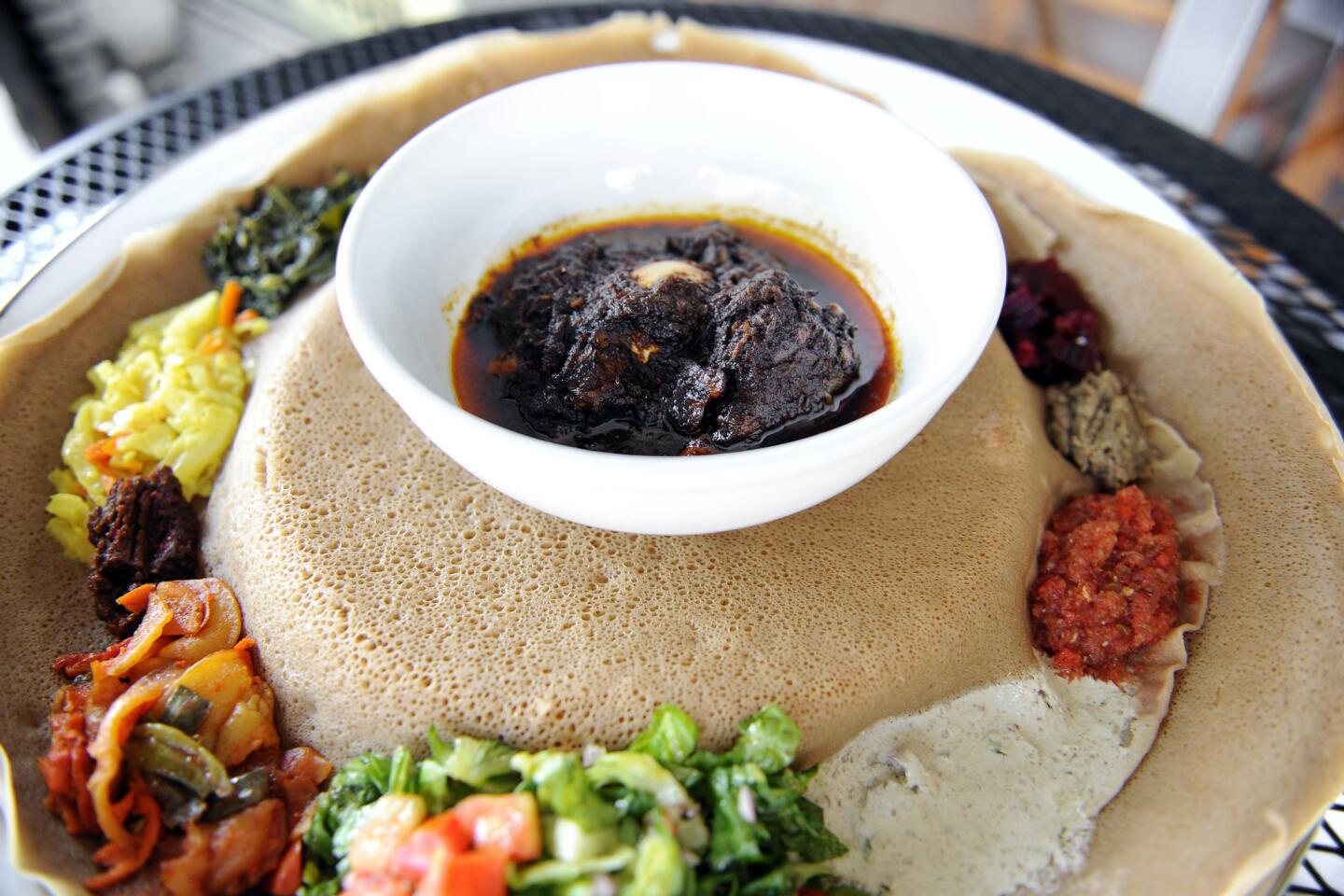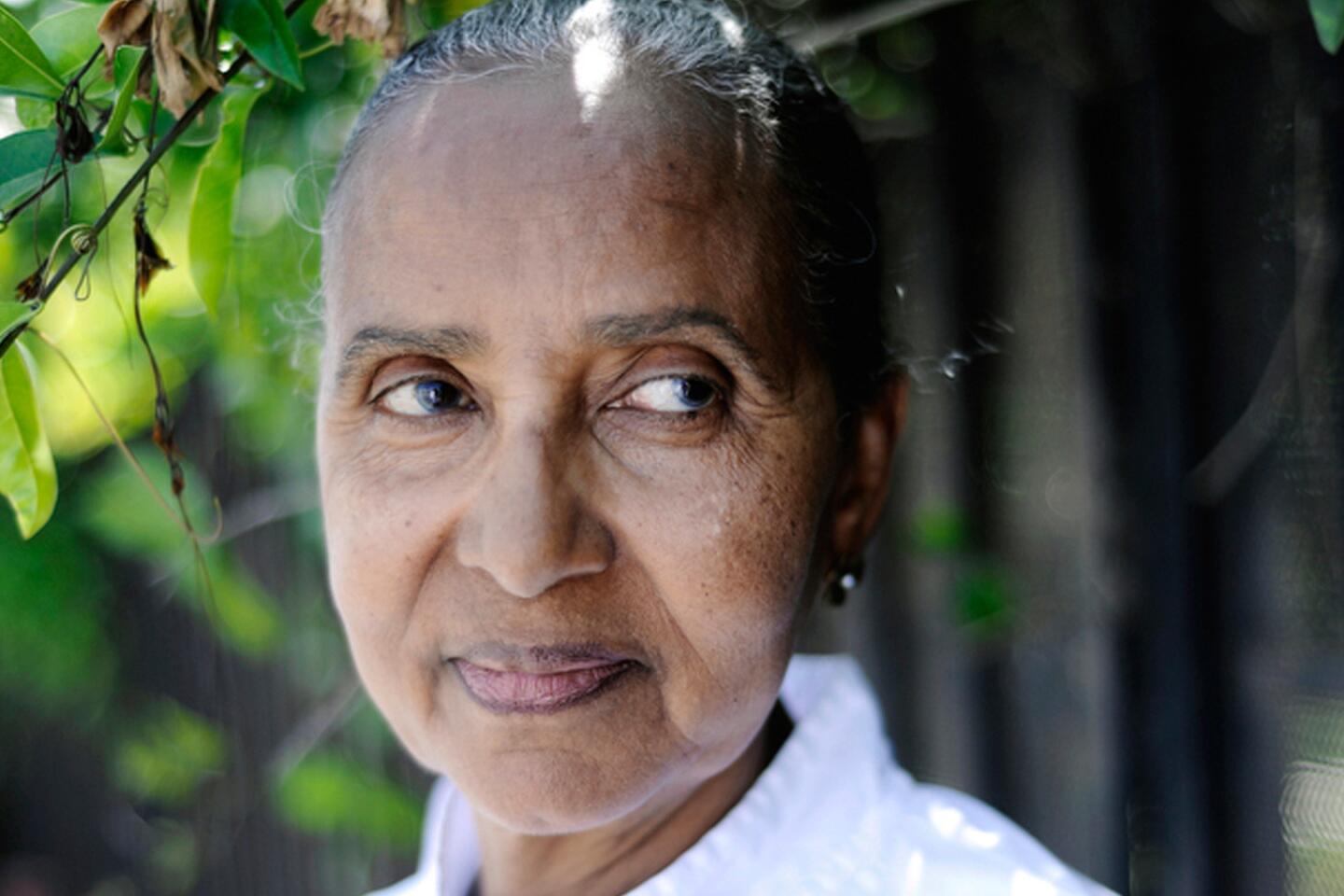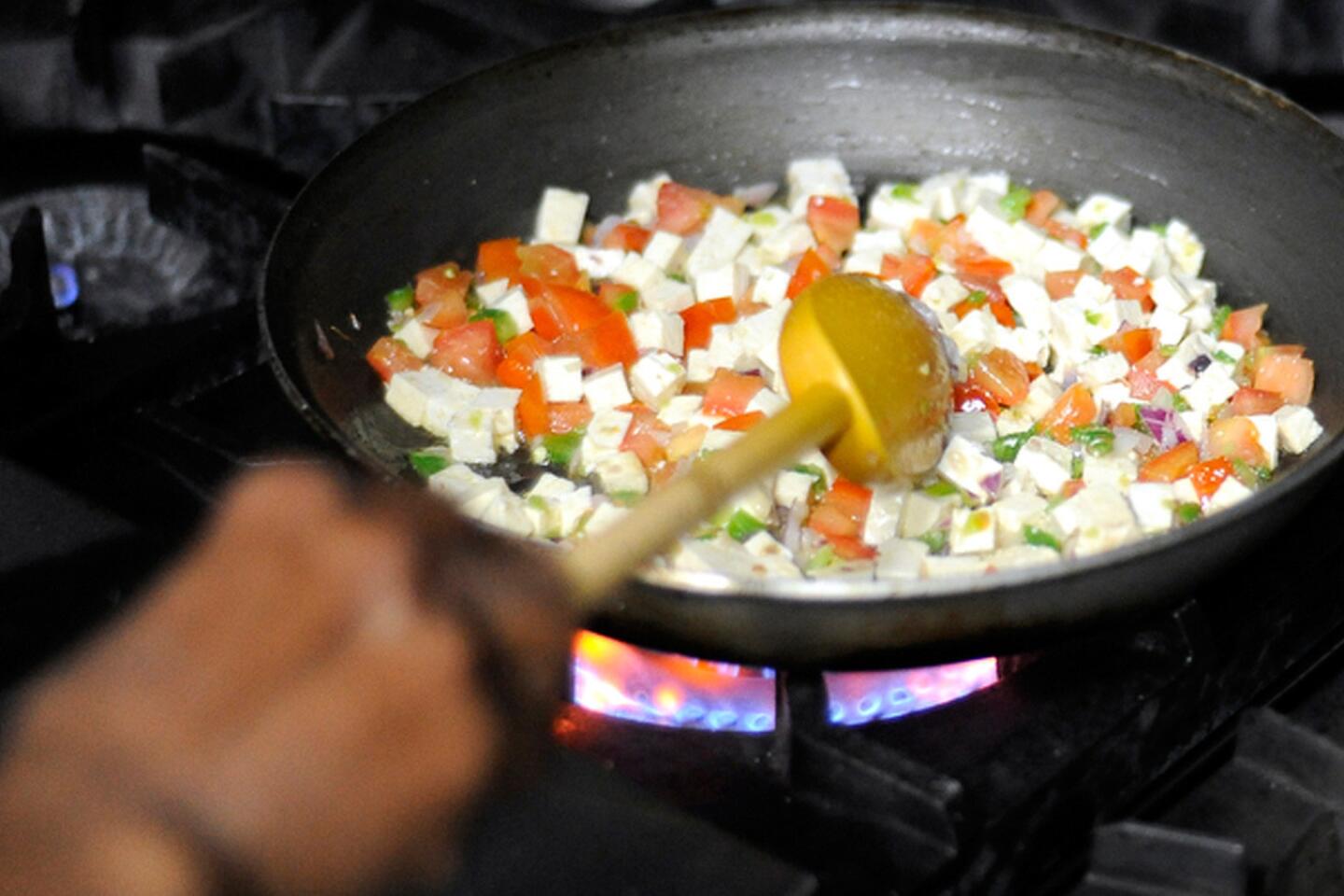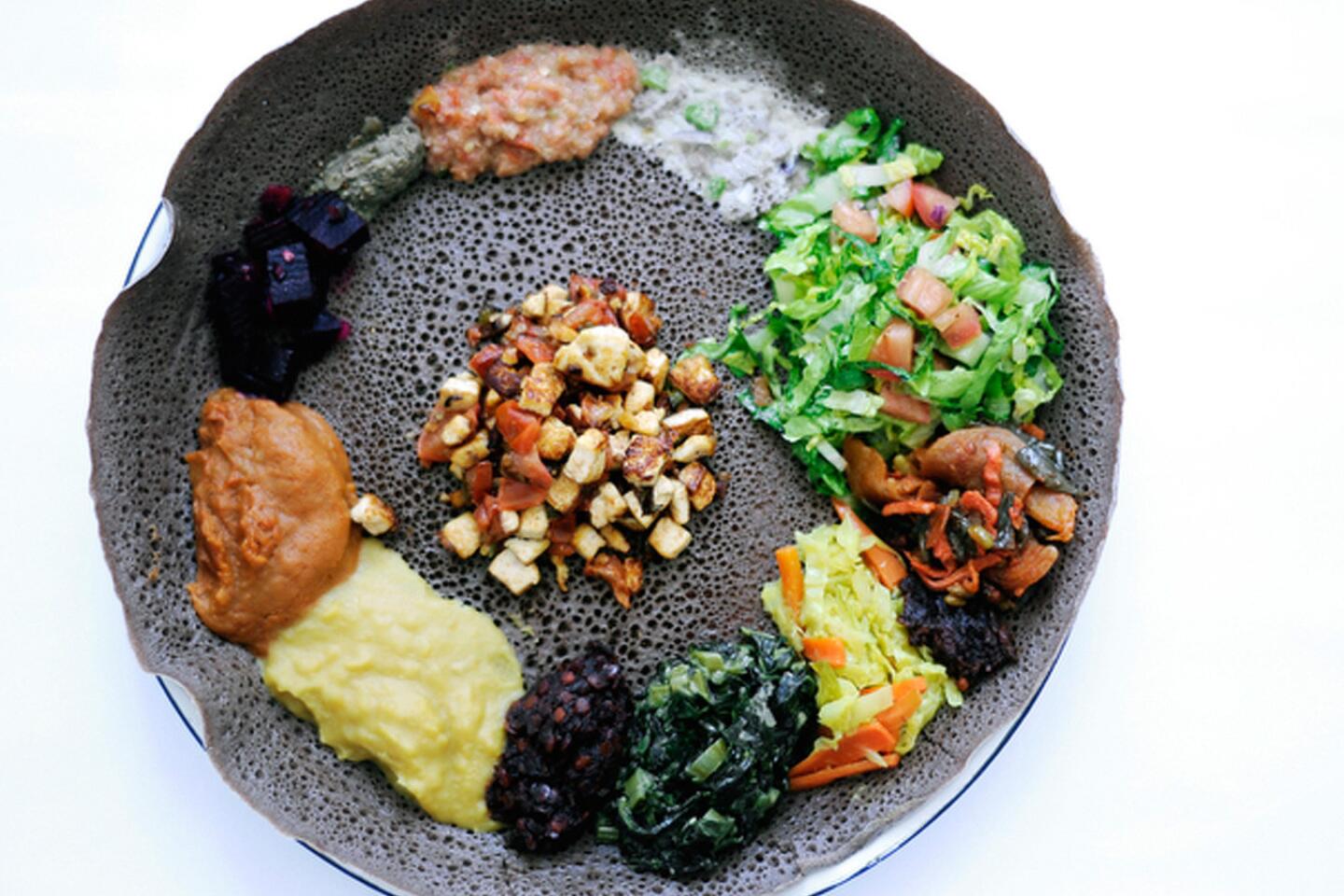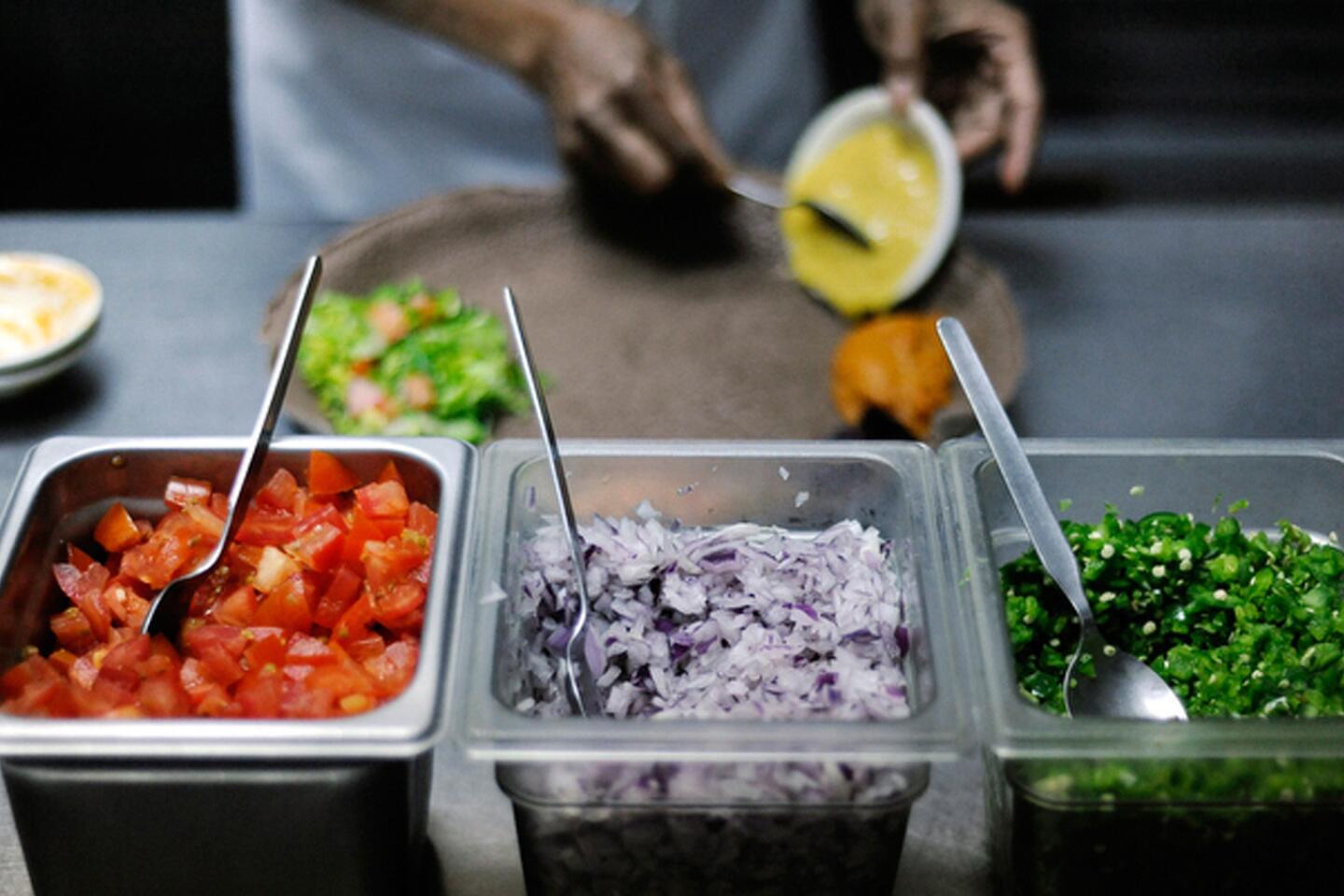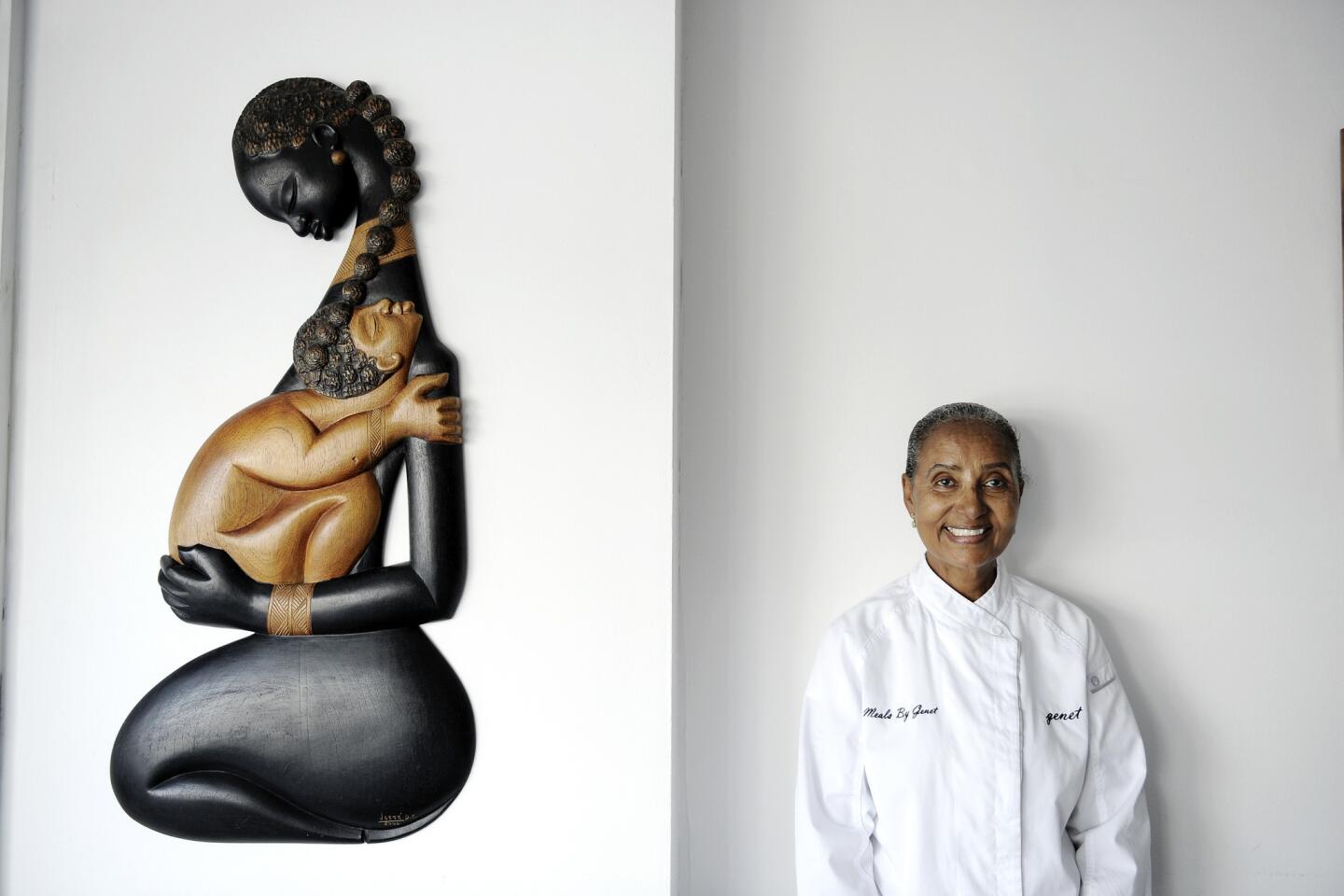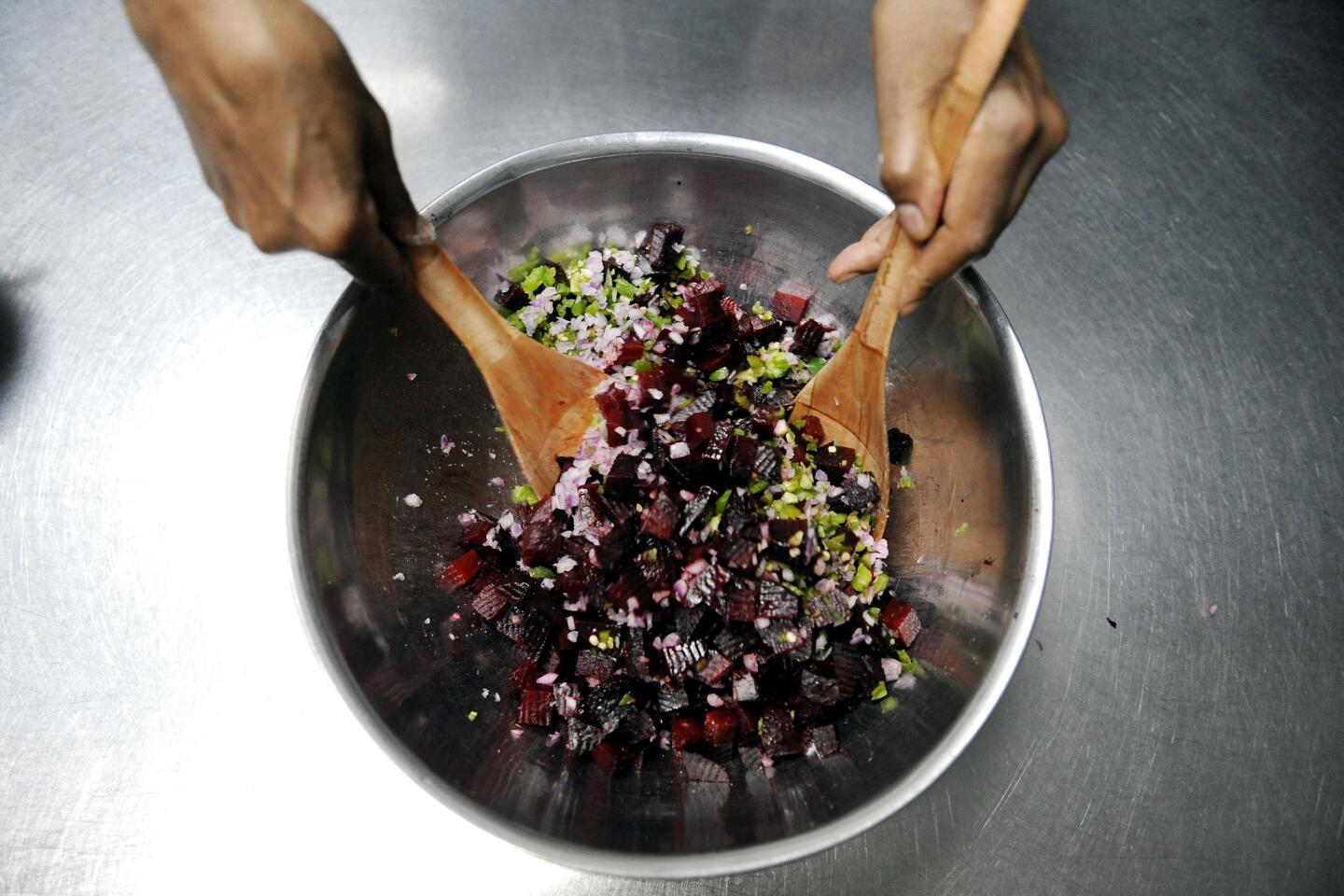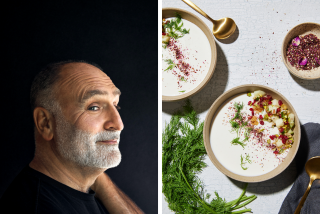Ethiopian chef Genet Agonafer may cook the best doro wot in town, but she hasn’t eaten it in years

Genet Agonafer is famous for the Ethiopian dish doro wot that she makes at Meals by Genet, but she’s vegan, and her menu is bountiful with vegetarian and vegan dishes.
Go down the few blocks of Fairfax Avenue that constitute the Little Ethiopia neighborhood of Los Angeles, past the antique shops and markets and repeating restaurants of the cozy, vibrant, cluttered-sidewalk community, and you’ll find Meals by Genet, which for the last 17 years has operated as a kind of culinary oasis.
Open the front door to chef-owner Genet Agonafer’s restaurant, a dining room that seems both a local fixture and oddly incommensurate with the neighborhood. White tablecloths. Starched napkins fanned in wine glasses. Candlelight throwing shadows on museum-white walls hung with framed art. Juxtaposed with the serene bistro aesthetic is Agonafer’s traditional Ethiopian cooking: platters covered with injera, the dark-lavender-colored teff flatbreads that function as plate, utensil and accompaniment, and loaded with colorful zones of vegetables and stews and condiments, all eaten by hand.
And at the center of almost all of the platters on the tables — as if by a kind of gravitational pull — is Agonafer’s doro wot, the intense, long-cooked, chile-spiked chicken stew that is so intrinsic to Ethiopian cuisine that, says Agonafer, in the arranged marriages that are still commonplace in her native country, “the guy, before he even looks at you, he tastes the doro wot: It’s that important.”
Yet this dish, so important to Agonafer herself that she named the version on her menu after her only grandchild, Ria, is one that the chef hasn’t eaten in years. Nor has she eaten the excellent kitfo, butter-laden steak tartar; the beef or chicken tibs; or even the whole trout she’s had on the menu since the restaurant opened in 2000: “I was vegetarian for a long time and became a vegan three years ago,” says Agonafer, who doesn’t drink what’s on her wine list either: She got sober in 1985.
This is hardly a “My name is Genet” story. Agonafer (whose first name is pronounced gen-ette, not as one would the late Frenchman Jean Genet, though it is tempting to do so) describes her personal food-and-drink evolution neither as testimonial nor object lesson, but just as a way of getting progressively more healthful, to live longer and more happily for her family and for herself.
“I’ve been clean for all these years,” she says, smiling, of her previous life. Before she became one of the best Ethiopian chefs in Los Angeles, she was an Addis Ababa kid learning to cook, briefly a housewife in Sweden, then an immigrant Denver waitress. “We were wild in the ’70s,” she says fondly.
Agonafer is a lot like her restaurant: a subtle study of opposites. Dressed invariably in tidy chefs whites, so soft-spoken that her voice barely registers above the din of the dining room, she moves deliberately around her restaurant. At 64, her faintly graying hair pulled back into a ballerina’s bun, she’s slight and as graceful as the art on the restaurant’s walls — a combination of traditional and contemporary work, including her latest treasure, a painting of the chef holding her almost-2-year-old granddaughter.
Yet watch Agonafer through the kitchen’s pass, a smallish window where her reservations book often sits — next to a large refrigerator papered with photos of and postcards from Nelson Mandela and the Obama family — and she seems transformed. She deftly moves the pots around the few burners on the single stove, pan-frying her vegan version of tibs, a heady dish of diced, spiced tofu; then darts around the center island station, spooning the many condiments and sauces around the serving dishes and platters. The vat of doro wot (“I spend all my life doing this”) bubbles on a back burner, a magnificent cauldron.
This transformative energy can be attributed, at least in part, to the unusual fact that Agonafer has always been the only cook at Meals by Genet. “For the first seven years, I tried to train someone else but gave up,” she says as she sends platter after platter over the pass, coordinating with her small staff of helpers and servers, some of whom have been working with her for years. Her kitchen operates a lot like the one-woman catering business that is also part of Agonafer’s origin story.
The story goes like this: Agonafer was born and raised in Addis Ababa, Ethiopia’s capital, as part of a large family. “The woman who raised my mom was a great cook: I sat by her and started making food.” Agonafer grew up, became a stewardess for Ethiopian Airlines, met and married her husband, a doctor, and moved to Sweden with him when she was pregnant with her only child. “Sweden is cold,” she recalls in her L.A. kitchen, “boring as hell. I was 21 years old.”
“I never wanted a restaurant. I just wanted to succeed for my son.”
— Genet Agonafer
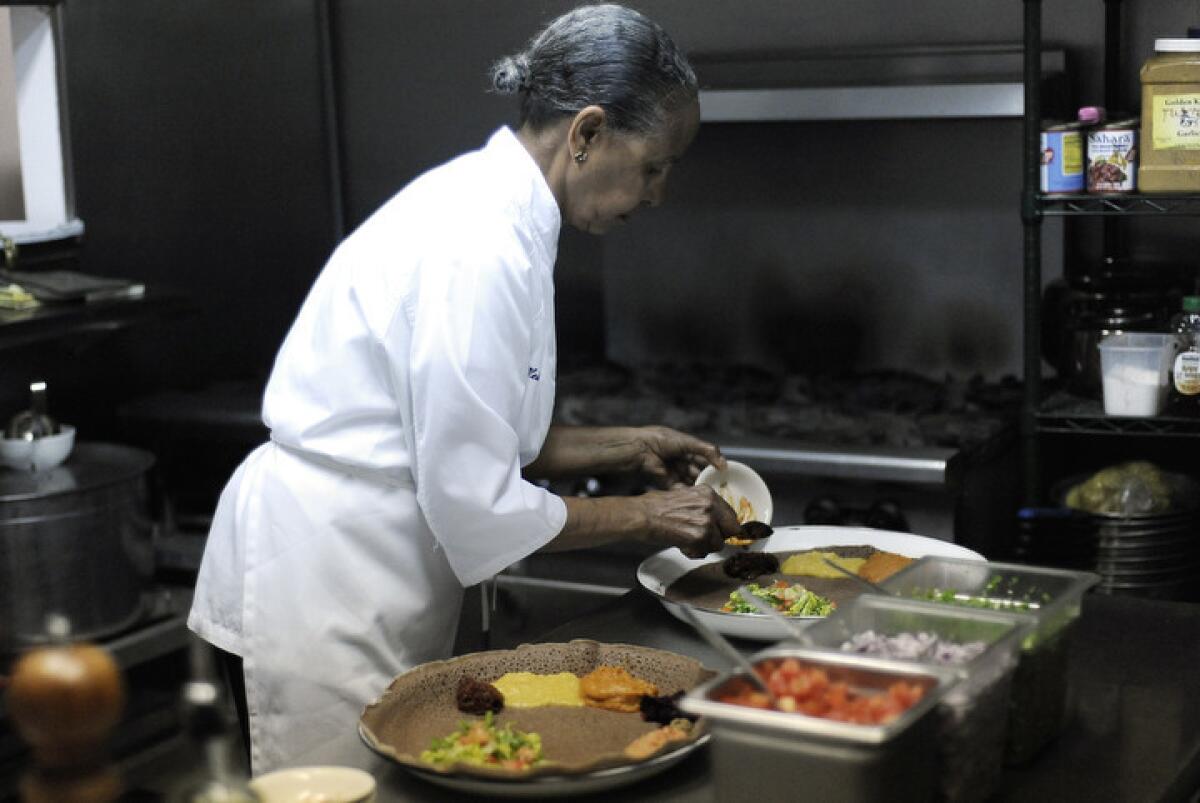
Eventually the young family returned to Ethiopia and the couple split. After Agonafer was laid off from her airline job, she and her young son followed an older brother and older sister to Colorado. “In my country,” says Agonafer, who has 11 full siblings and four half siblings, “if one person comes, you drag everybody.” In the late ’80s, Agonafer moved to California so her son could go to school, first at La Jolla Country Day School (notable alumnus: Tucker Carlson), then to Occidental, then USC medical school, at which point, she says, “I stopped following him.”
Agonafer, by then a waitress in Los Angeles, describes the beginning of her catering career as half-kismet, half-accident: A regular customer at the restaurant where she worked asked her to come serve at a dinner party. Instead, she ended up cooking the dinner, and by the end of the event, she had a restaurant name, business cards and an ad hoc business running out of her one-bedroom apartment. “The catering was never Ethiopian food,” Agonafer says of the Italian-Californian dishes she made in the beginning, which she cooked because of its local familiarity. “I didn’t let people know about that stuff.”
The restaurant was accidental too, the space found because she needed a catering kitchen. “I never wanted a restaurant. I just wanted to succeed for my son,” Agonafer says of the early days at her restaurant, which she owns with her son, now a doctor and economist in New York, and the father of Ria Genet. “If I could, I’d walk away tomorrow and be a full-time grandma.”
Also on Agonafer’s stove: a big pot of shiro. “That’s our food; that’s the poor people food,” she says of the orange split pea dish that’s also a staple of Ethiopian cuisine. “In my country, the vegetarian food is mostly for people who don’t have money; it’s the opposite of how it is here.”
She considers both her pot and her situation, seasoned with traditional spices and irony. “Here people eat very healthy,” she says of many Angeleno diners who come to her restaurant looking for traditional Ethiopian food and are often surprised to find so many vegan dishes among those that form the backbone of the cuisine. Much of traditional Ethiopian food also happens to be gluten-free, she points out, including all that injera. “It’s also about awareness. I used to smoke four packs a day too; I never thought it was bad for you!”
As she talks — in motion, in her kitchen, or at rest, seated at one of the immaculate tables in her dining room — Agonafer is at once amused and circumspect, as if she’s been long accustomed to taking, well, the long view. “Being vegan actually helped me,” she says of the last few years of that journey. “I used to go crazy — how am I going to be vegan and not have dessert? Now I’m gluten-free, I’m this-free, I’m that-free.” Her voice trails off, laughing.
1053 S. Fairfax Ave., Los Angeles, (323) 938-9304, mealsbygenetla.com
ALSO:
What does it mean to be a chef in Los Angeles in 2017?
What does it mean to be a chef in Los Angeles in 2017? We asked a few of them
More to Read
Eat your way across L.A.
Get our weekly Tasting Notes newsletter for reviews, news and more.
You may occasionally receive promotional content from the Los Angeles Times.
